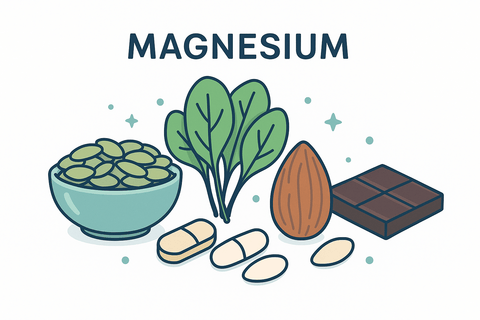14 products


Magnesium Benefits: Energy, Muscle, Mind & Bone Support
🧠 Magnesium Benefits: Energy, Muscle, Mind & Bone Support
📚 Table of Contents
-
Introduction
-
What Is Magnesium?
-
EFSA-Approved Health Claims for Magnesium
-
Why Magnesium Is Important for Human Physiology
-
Magnesium and Energy-Yielding Metabolism
-
Magnesium and Muscle Function
-
Magnesium and Nervous System Function
-
Magnesium and Psychological Function
-
Magnesium and Bone Health
-
Magnesium and Protein Synthesis
-
Magnesium and Fatigue Reduction
-
Magnesium and Electrolyte Balance
-
Natural Dietary Sources of Magnesium
-
Recommended Daily Intake
-
Symptoms of Magnesium Deficiency
-
Magnesium Absorption and Bioavailability
-
Types of Magnesium Supplements
-
Safe Use and Tolerable Upper Intake Levels
-
Who May Need Magnesium Supplementation?
-
FAQs
-
Conclusion
1. 📖 Introduction
Magnesium is a critical mineral involved in hundreds of biochemical reactions in the human body. It plays essential roles in muscle function, energy production, nerve transmission, bone health, and mental performance.
The European Food Safety Authority (EFSA) has evaluated and approved a range of health claims for magnesium, confirming its beneficial impact on key physiological functions.
This article explores all EFSA-approved magnesium claims, how magnesium works in the body, where it can be sourced, and how it can be safely used to maintain optimal health.
2. 🔍 What Is Magnesium?
Magnesium is a divalent mineral cation (Mg²⁺) that functions as a cofactor in over 300 enzymatic reactions. It’s essential for maintaining cellular structure, generating ATP (energy), and transmitting nerve impulses.
Magnesium is found in bones, muscles, and soft tissues, with approximately 60% stored in bone and the rest distributed throughout the body.
3. ✅ EFSA-Approved Health Claims for Magnesium
EFSA has approved the following health claims for magnesium:
-
Contributes to a reduction of tiredness and fatigue
-
Contributes to electrolyte balance
-
Contributes to normal energy-yielding metabolism
-
Contributes to the normal functioning of the nervous system
-
Contributes to normal muscle function
-
Contributes to normal protein synthesis
-
Contributes to normal psychological function
-
Contributes to the maintenance of normal bones and teeth
-
Has a role in the process of cell division
These claims are all scientifically substantiated under Regulation (EC) No 1924/2006.
4. 🧬 Why Magnesium Is Important for Human Physiology
Magnesium is crucial for maintaining:
-
Cellular energy production (as ATP requires magnesium to be biologically active)
-
Muscle contractions and relaxation
-
Signal transmission in the nervous system
-
Structural development of bone and teeth
-
DNA and RNA synthesis
Even mild deficiencies may impair biological systems and lower resilience to stress and fatigue.
5. ⚡ Magnesium and Energy-Yielding Metabolism
EFSA Claim: “Magnesium contributes to normal energy-yielding metabolism.”
Magnesium is a key cofactor in the conversion of carbohydrates, fats, and proteins into cellular energy (ATP). Without sufficient magnesium, this process is compromised, leading to lower vitality and endurance.
6. 💪 Magnesium and Muscle Function
EFSA Claim: “Magnesium contributes to normal muscle function.”
Muscle contraction and relaxation depend on electrical gradients regulated by calcium, sodium, and magnesium. Magnesium prevents muscle cramps, spasms, and twitches by helping balance calcium influx into cells.
7. 🧠 Magnesium and Nervous System Function
EFSA Claim: “Magnesium contributes to the normal functioning of the nervous system.”
Magnesium regulates neuronal excitability, aids in neurotransmitter release, and supports myelin sheath integrity, helping maintain calm and coordination in motor and sensory pathways.
8. 🧘 Magnesium and Psychological Function
EFSA Claim: “Magnesium contributes to normal psychological function.”
Magnesium modulates neurotransmitters such as dopamine and serotonin, influencing mood, focus, and emotional balance. Deficiency is often correlated with irritability and cognitive issues.
9. 🦴 Magnesium and Bone Health
EFSA Claim: “Magnesium contributes to the maintenance of normal bones and teeth.”
Magnesium supports the structural development of bones by regulating calcium and vitamin D activity. It’s vital in preventing mineral loss and maintaining bone density over time.
10. 🧬 Magnesium and Protein Synthesis
EFSA Claim: “Magnesium contributes to normal protein synthesis.”
Protein synthesis is essential for muscle repair, immune function, and tissue growth. Magnesium acts as a catalyst in mRNA translation and amino acid polymerization.
11. 💤 Magnesium and Fatigue Reduction
EFSA Claim: “Magnesium contributes to the reduction of tiredness and fatigue.”
A lack of magnesium impairs cellular respiration and nutrient utilization, resulting in sluggishness and low energy. Adequate intake supports daily vitality.
12. 💧 Magnesium and Electrolyte Balance
EFSA Claim: “Magnesium contributes to electrolyte balance.”
Magnesium maintains ionic equilibrium in bodily fluids, supporting hydration, blood pressure regulation, and neuromuscular balance.
13. 🥦 Natural Dietary Sources of Magnesium
| Food | Magnesium (mg/100g) |
|---|---|
| Pumpkin seeds | 535 mg |
| Almonds | 268 mg |
| Spinach (boiled) | 87 mg |
| Black beans | 171 mg |
| Avocado | 29 mg |
| Dark chocolate (70–85%) | 228 mg |
| Whole wheat bread | 78 mg |
| Quinoa (cooked) | 64 mg |
| Brown rice (cooked) | 44 mg |
| Banana | 27 mg |
Note: Soaking and sprouting legumes or seeds can increase magnesium absorption.
14. 📏 Recommended Daily Intake (EFSA Guidance)
| Group | Magnesium (mg/day) |
|---|---|
| Adult Men | 350 mg |
| Adult Women | 300 mg |
| Adolescents (15–17) | 300–350 mg |
| Children (4–14) | 170–280 mg |
| Pregnant Women | 300–310 mg |
| Breastfeeding Women | 310–320 mg |
EFSA sets Adequate Intake (AI) levels based on population needs.
15. ⚠️ Symptoms of Magnesium Deficiency
Symptoms may include:
-
Muscle cramps or spasms
-
Fatigue and low energy
-
Nervousness, irritability
-
Numbness or tingling
-
Irregular heartbeat
-
Poor concentration
Certain conditions (e.g., diabetes, alcoholism, gastrointestinal disorders) increase risk of deficiency.
16. 🔄 Magnesium Absorption and Bioavailability
Magnesium absorption occurs in the small intestine, ranging from 30–60% depending on:
-
Form (e.g., citrate > oxide)
-
Presence of dietary fiber and phytates
-
Overall intake levels
-
Vitamin D status
Acidic environments (e.g., taking with food) typically enhance absorption.
17. 💊 Types of Magnesium Supplements
| Form | Bioavailability | Notes |
|---|---|---|
| Magnesium citrate | High | Gentle laxative effect |
| Magnesium bisglycinate | High | Gentle on stomach, ideal for sensitive users |
| Magnesium oxide | Low | High elemental content, often used for constipation |
| Magnesium chloride | Medium | Often found in topical applications |
| Magnesium malate | Medium-high | Supports energy metabolism |
| Magnesium taurate | Medium | Often paired with cardiovascular goals |
Always check for elemental magnesium content, not just the total compound weight.
18. ⚖️ Safe Use and Tolerable Upper Intake Levels
EFSA sets a Tolerable Upper Intake Level (UL) of 250 mg/day from supplements (not including food).
High supplemental intakes may cause:
-
Diarrhea
-
Nausea
-
Abdominal cramping
People with kidney disorders should use magnesium supplements under medical supervision.
19. 👥 Who May Need Magnesium Supplementation?
-
Athletes (due to electrolyte loss via sweat)
-
Pregnant or breastfeeding women
-
People on low-calorie or restrictive diets
-
Elderly individuals with reduced absorption
-
People under chronic stress or with sleep disturbances
-
Users of diuretics, proton pump inhibitors, or antibiotics
20. ❓ FAQs
Q1: What are the benefits of magnesium?
EFSA-approved claims include support for energy, bones, muscles, nervous system, psychological function, and protein synthesis.
Q2: Can magnesium help with sleep?
While no EFSA claim exists for sleep, magnesium supports the nervous system and may promote relaxation.
Q3: What foods are highest in magnesium?
Pumpkin seeds, almonds, spinach, legumes, and dark chocolate are excellent sources.
Q4: When is the best time to take magnesium supplements?
Evening is often preferred, especially for relaxation, though magnesium can be taken any time with food.
Q5: Can I take magnesium every day?
Yes, daily intake is necessary. Just ensure you do not exceed the upper limit from supplements.
21. ✅ Conclusion
Magnesium is an indispensable mineral that supports a wide range of biological functions. Based on EFSA-approved health claims, magnesium:
-
✅ Supports energy metabolism
-
✅ Aids muscle and nerve function
-
✅ Maintains bone and psychological health
-
✅ Reduces fatigue
-
✅ Helps maintain electrolyte balance
For optimal health, include magnesium-rich foods in your diet or consider supplementation as needed—particularly during periods of stress, growth, or increased physical demand.













